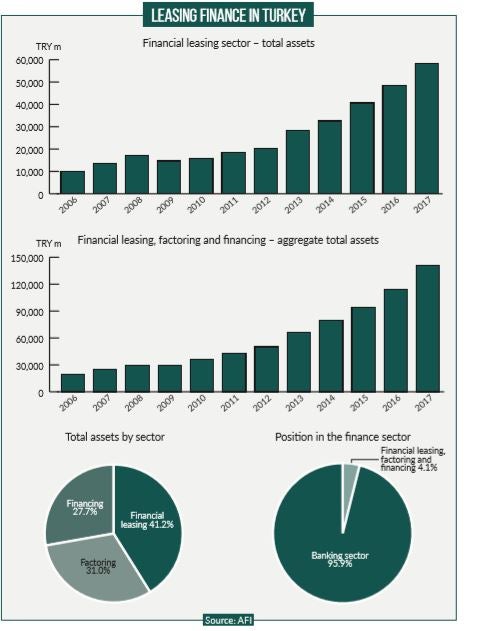
Turkish lease market participants are preparing themselves for a challenging 2019 as the country seeks to establish a degree of equilibrium following a period of intense economic and political upheaval. Paul Golden reports.
Turkey has experienced turmoil in the past, but the last few years have been particularly eventful for a country that holds a strategically important location between Europe and Asia.

Access deeper industry intelligence
Experience unmatched clarity with a single platform that combines unique data, AI, and human expertise.
The Syrian civil war that broke out in 2011 has seen huge numbers of refugees cross the border into Turkey, while the failed coup of 2016 resulted in major political change, with a subsequent referendum approving a switch to a presidential system.
Inevitably, these events have exerted a considerable influence on the economy. The IMF notes that following a slowdown in activity in the year of the unsuccessful coup, growth recovered strongly in Turkey last year, driven by large fiscal stimulus and policydriven credit impulse.
Such was the strength of the recovery last year that the economy exhibited signs of overheating, such as high inflation and a wider current account deficit. Indications of possible oversupply in the building and construction sector have also emerged. Despite a tightening of monetary policy, inflation rose to almost 12% during 2017.
The central bank increased the effective cost of funding to banks to contain inflation spillovers from the large lira depreciations in the final quarters of 2016 and 2017. The sizeable expansion of state loan guarantees was the main driver behind the acceleration of bank credit growth in 2017.

US Tariffs are shifting - will you react or anticipate?
Don’t let policy changes catch you off guard. Stay proactive with real-time data and expert analysis.
By GlobalDataCommercial loan growth has since moderated, as the impetus from state loan guarantees fell towards the end of the year. The IMF forecasts that economic growth will decelerate to close to 4.5% this year.
Inflation is projected to remain well above target and the current account deficit is expected to remain elevated.
The World Bank’s Turkey Economic Monitor, published in May 2018, notes that despite corporate and financial sector buffers, tightening financial conditions could further raise macro-financial risks.
Corporate vulnerability of companies listed in the Turkish stock markets rose in 2017 and non-financial corporates face elevated interestrate and exchange-rate risks due to net open foreign exchange positions.
Increased costs of finance and a weaker lira could affect financial sector assets – risks that may be exacerbated by the projected slowdown in economic activity. Finansal Kurumlar Birliği – the Association of Financial Institutions (AFI), an umbrella organisation for companies in Turkey that provide financial leasing, factoring and financing – notes that the financing sector expanded last year, with 25 companies in the sector employing almost 1,500 people.
A global survey of 2,300 businesses in 36 economies conducted by Grant Thornton last year found that while only 38% of the businesses surveyed globally had begun the process of recognising leases on their balance sheet, 81% of Turkish companies had taken this step.
Australia was the only country where a higher percentage of businesses were ready for this change. However, the AFI acknowledges that leasing penetration remains low, at 5.6%.
The association’s Leasing and Strong Tomorrows with SMEs project, whose aim is to acquaint small businesses with the leasing industry, organised a number of meetings across the country during 2017 in an attempt to raise awareness of the merits of leasing.
Total leased assets increased by 20% yearon-year to TRY58.1bn (€12.8bn) at the end of 2017, and new business was up by 21%.
Looking at a breakdown of leased assets by transaction value, 27% of the total consisted of business and construction machinery, 21% real estate, 7% textile machinery and 7% metalworking machinery.
The authority to extend credit underwritten by the Credit Guarantee Fund was expanded to include bank-controlled financial leasing companies in the second half of the year, and the AFI believes that such lending contributed significantly to Turkey’s economic growth in 2017.
According to deputy chair Ünal Gökmen, making it possible for the sector to move forward in this area will ensure that Credit Guarantee Fund-backed credit is used to finance investment.
New transactions amounting to $4.64bn (€3.98bn) were carried out in the first half of 2018, while the value of transactions realised in the same period of 2017 was $4.56bn, observes AFI deputy secretary Hakan Güzelce. “These amounts indicate that new transactions carried out in the first half of this year increased by 1.8% compared to the same period of last year,” he says.
“The amount of new transactions carried out in 2017 totalled $10.66bn, while the volume of transactions during the previous 12-month period amounted to $9.45bn, representing an increase of 12.8% for 2017.”
Operational leasing volumes amounting to $3.8bn are included in the 2017 total. Güzelce estimates that total transaction volumes for 2018, excluding operational leasing, will reach approximately $5.22bn, a significant decrease on the volume of transactions recorded last year.
“In 2018, our unit of currency suffered a significant weakness, and then there has been some recovery,” he adds.
“Currently, our economy is seeking balance. The government declared the likely 2018 GDP growth rate to be 3.8% and the projected rate for 2019 to be 2.3% compared to realised growth of 7.4% last year as per the 2019-2021 New Economy Program issued by Ministry of Treasury and Finance.”
It is assumed that the growth rate will be 3.5% in 2020 and 5% in 2021. Average GDP growth was 4.5% between 2005 and 2010, and 6.2% between 2011 and 2017. According to the AFI’s deputy secretary general, it is obvious that 2019 will be a tough year when similar challenges are faced by many other countries.
“The planned fiscal reduction in the US also needs to be taken into consideration,” he says. “Regarding increasing interest rates in the US, the next 12 months will be a difficult period for providing funding.”
However, he is also keen to point out that the AFI believes this is a temporary situation and that the penetration rate for leasing in Turkey – which is still very low compared to similar countries – is an important indicator of the sector’s growth potential.
“In Turkey, the non-banking finance sector’s share of the total finance sector is about 14%,” he concludes.
“When it is considered that this rate is 36% in Germany and 31% in Spain, the growth potential of the Turkish nonbanking finance sector is high. So after the likely downward pressures in 2019, a strong recovery is expected.”
A number of developments during 2018 highlighted the challenging conditions facing lease companies in Turkey. During an interview with Reuters in August, sources within the European Bank for Reconstruction and Development (EBRD) stated that it had successfully stress-tested its balance sheets for a 40% drop in the value of the lira.
However, the decline in the Turkish currency had already gone beyond that envisioned in the EBRD stress-test scenario.
The EBRD’s €7.3bn of investments in the country include leasing and SME financing loans to QNB Finans, Garanti Leasing, Aklease, Yapı Kredi, TSKB and Isbank.
Only weeks earlier, QNB Finans Leasing was the recipient of a €25m wholesale loan directed at SMEs looking to expand their resource efficiency and renewable energy capabilities.
This loan was extended under the third phase of the Turkey Sustainable Energy Financing Facility, a €1bn wholesale lending programme aimed at leasing companies and commercial lenders, through which the EBRD says around 1,000 projects have been financed.
In August, Mitsubishi and its global leasing division disposed of their stakes in one of Turkey’s biggest car leasing companies as foreign investors started hedging against the country’s currency crisis.
The companies sold their stakes in Ekim Turizm, which owns Intercity, one of Turkey’s largest fleet and personal leasing providers and also operates a de-fleeting retail platform.

Mitsubishi had invested in the company in 2008, seeing high growth potential in populous emerging markets such as Turkey.
At the time of investing, Ekiz Turizm intended to grow to 75,000 vehicles and become one of the top 10 leasing firms worldwide; the company now has a fleet of around 50,000 vehicles. Currency volatility has affected a number of lease companies in Turkey.
LeasePlan’s profitability declined by 5.4% year-on-year during the first quarter of 2018 on the back of a €19.8m hit caused by depreciation of the lira, while it was reported that Intercity had been hedging against a devaluation of the domestic currency by pricing leases in euros in recent years, to match the company’s cost of financing.
But the last 12 months has not been all about companies moving away from Turkey or seeing their profitability decline.
In September, Alphabet announced that it was commencing operations in Turkey in partnership with Hedef Filo, a Turkish leasing company with over 28,000 vehicles in more than 1,000 service locations.
Services include short-term car hire, full operational leasing, and sales and leaseback as a financed product.
Turkish businesses can also access Alphabet’s range of add-on mobility products and services, including fuel cards, replacement vehicles, roadside assistance and legal insurance. Cenk Altuntaş, general manager at Grenke Kiralama, observes that due to the economic crisis that hit Turkey this summer, banks have been reluctant to push credit.
“As the majority of the leasing companies are subsidiaries of banks in Turkey, it seems that 2018 targets will therefore stay below expectations,” he says.
“The fact that refinancing rates have increased dramatically in the last few month is the most important challenge for leasing firms, and interest rates are affected accordingly.”
When asked whether there are any segments of the market that are particularly strong or weak, Altuntaş refers to the construction sector as the biggest segment, with a 27% market share in 2017.
“However, this sector may be weaker in 2018 due to slowing sales. Economic conditions have an effect on investment decisions which correlate with demand – for example, as the manufacturing sector is decreasing, expectations of a rise in demand would be irrational.”
His expectations for growth in the Turkish leasing market over the next 12 months are tempered by a number of developments that will affect the wider economy during 2019.
“Regarding the growth rate, expectations are set to 4% next year,” he notes.
“If it slows down further, a recession period may start which could delay investment plans.
“Expectations for the trade deficit are in the region of $50bn, although this may be much lower depending on the movement in exchange rates – our imports were lower in September for the first time for a long time.”
Then there is the political situation. Elections for the local municipalities will be held in March 2019, which means the government may be slower to take some difficult decisions that would affect issues such as tax policies.
“The inflation rate for this year will be high for a developing country, and will affect investment plans next year,” he concludes. “The short-term target is for inflation to be stabilised at a level below 10%.”







